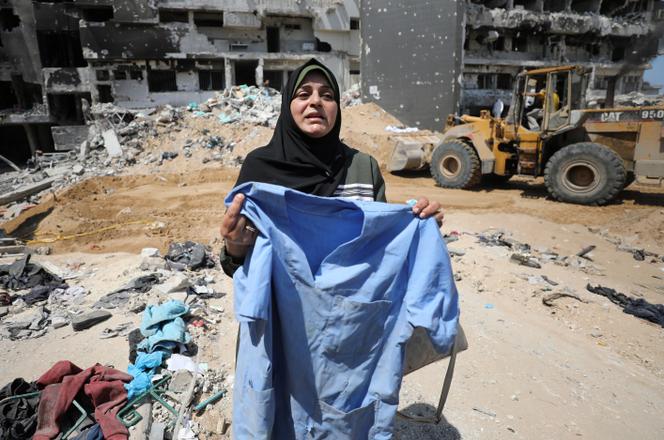


Every day for the past three weeks, Maha Souilem, a 38-year-old nurse, mingled with residents and rescue workers searching the sandy embankments in the courtyard of Al-Shifa Hospital, in the heart of Gaza City, and the surrounding ruins. The torn silhouette of the main building, blasted and charred, stood out against the azure spring sky. Maha was looking for her husband.
After 14 days of siege, the Israeli army withdrew from the area on April 1, leaving behind a landscape of devastation and the acrid smell of decomposing bodies. Palestinians were still exhuming corpses: The civil defense told NPR radio station that it has found 381 in and around Al-Shifa. According to rescue workers, some 160 bodies were still under the rubble of the buildings.
According to Hamas, around 1,000 buildings have been burnt or damaged in the surrounding area, an assessment echoed by the UN Office for the Coordination of Humanitarian Affairs (OCHA). The assault on the hospital is the largest operation carried out by the Israeli army in the enclave since the beginning of the war triggered by the Hamas attack on Israel on October 7, 2023. Al-Shifa, which means "healing" in Arabic, has become a place of death. The Gaza Strip's largest hospital is now totally destroyed. From a distance and onsite with the help of a collaborator, Le Monde gathered testimonies from Palestinians who lived through the assault. The international press was still being denied access to the enclave by the Israeli authorities.
In the courtyard, two mass graves were discovered – 30 bodies in all, some in an advanced state of decomposition. Only 12 have been identified; relatives recognized a shoe here, a shred of clothing there. Last week, one of Maha's colleagues, who thought her son had been arrested, eventually found him among the bodies. "I was stunned," said the nurse. Since their home had been bombed, she had been living with her husband, an ambulance driver, and their two daughters, aged 2 and 6, in Al-Shifa Hospital. The couple forgot themselves in their work. They were "serving [their] people 24 hours a day."
On March 18, the Israeli attack took them by surprise, in the middle of the night. The hospital began to resound with "gunshots and explosions of unheard-of intensity." "They blew up the room next to us," said Maha. A loudspeaker announced the siege of the building. "Everyone must surrender. No one leaves, the gates are closed," said a faceless voice. Patients, doctors and displaced people bumped into each other in the rush. Those who approached the windows were shot at.
You have 75.13% of this article left to read. The rest is for subscribers only.
